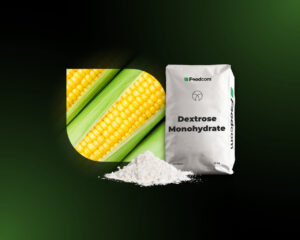- The dextrose market is experiencing significant price fluctuations due to supply chain disruptions and geopolitical tensions.
- Corn flour prices vary by region, mainly due to local production costs and raw material availability.
- The EU has passed the Reconstruction of Nature Act, facing strong opposition from farmers fearing for their livelihoods.
Welcome to our plant-based newsletter!
This week, we highlight the fluctuating markets of dextrose, corn flour, and carob, examining the factors influencing their prices and trends. Additionally, we report on two significant EU developments: the reintroduction of import duties on Ukrainian eggs and the narrow approval of the controversial Nature Restoration Law, which has faced strong opposition from farmers. Stay informed on how these changes could affect various sectors and stakeholders.
Let’s take a look at what else is happening on the market!
Products of the Week
Dextrose
As of June 2024, the Dextrose market continues to experience significant price fluctuations, mainly due to supply chain disruptions, rising raw material costs and geopolitical tensions. Dextrose prices are rising due to increased costs of basic raw materials, such as Corn Starch, and logistical problems resulting from recent events, such as multiple bridge collapse, which disrupted supply chains. In addition, tensions in the Gulf region are leading to greatly increased shipping costs, and delays, further pushing up Dextrose prices in the global market.
In Europe, dextrose prices are also impacted by a weakening economy and high inflation, reducing consumer purchasing power and affecting demand. In Asia, declines in commodity prices and production higher than demand have contributed to the decline in Dextrose prices, although demand remains stable.
Corn Flour
As of June 2024, Corn Flour prices show considerable variation from region to region. These differences are due to local production costs, availability of raw materials, and delivery logistics. In markets such as Japan, high import costs lead to significantly higher Corn Flour prices compared to countries such as the United States, where corn production is high. Global disruptions in supply chains, including rising freight costs and logistical problems, further affect prices. Geopolitical tensions in key trading regions and changes in trade policies, such as tariffs and import regulations, also play a role. Seasonality of crops and changing climatic conditions can cause fluctuations in the availability of Corn Flour, which affects its prices on international markets. Consumers looking for Gluten-free bread are asking for Corn Flour or fava bean flour varieties.
Carob
The Carob market is showing rapid growth, driven by increasing demand for healthy, plant-based alternatives to Cocoa. Carob is increasingly popular for its health benefits, such as its lack of caffeine, high fiber, antioxidant content, and low fat and sodium content. Additionally, carob is naturally sweeter than cocoa, which allows for a reduction in added sugar in recipes.
Carob markets around the world, especially in regions such as North America, Europe and Asia-Pacific, are experiencing sales growth in both the food and pharmaceutical sectors. Supermarkets, hypermarkets and specialty stores are increasing their offerings of products containing Carob, contributing to the availability and popularity of the ingredient. In the Asia-Pacific region, the carob market is projected to be the most lucrative, due to the growing interest in healthy eating and plant-based diets.
For those looking to substitute Carob for Cocoa, it’s suggested to start with a 40% replacement ratio, then gradually increase to 60%, and eventually 80%. This approach allows for a smoother transition in taste and texture while taking advantage of carob’s natural sweetness and health benefits.
NEWS
EU to reimpose import duties on ukrainian eggs
The European Commission is set to reintroduce import duties on Ukrainian eggs in the coming weeks, as Ukraine has surpassed its quota for egg exports to the EU, according to Euronews. This move follows the implementation of a new free trade scheme on June 6, which includes a safeguard mechanism to protect sensitive sectors like eggs, poultry, and sugar. The mechanism allows the EU to reintroduce tariff quotas if imports exceed average volumes from July 2021 to December 2023. Ukrainian oats will also face duties from June 19 for exceeding quotas, and sugar imports are under scrutiny, potentially facing similar measures soon.
EU approves nature restoration law amid farmers’ backlash
The European Union narrowly passed the Nature Restoration Law on Monday, aiming to restore 30% of natural habitats by 2030 and 90% by 2050. Despite opposition from countries like Finland, Italy, and Poland, the law achieved the necessary support. Farmers’ organizations have condemned the law, fearing it will reduce arable land and threaten their livelihoods and Europe’s food security. Controversy also arose from Austrian Environment Minister Leonore Gewessler’s unexpected vote in favor, potentially leading to legal action. Dutch farmers’ group LTO criticized the financial strain on agriculture and unclear funding plans, predicting more protests if their concerns are not addressed.

![What’s shaking up the market? Get the latest on Dextrose, Corn Flour & Carob! [59th Foodcom PLANT-BASED Newsletter] What’s shaking up the market? Get the latest on Dextrose, Corn Flour & Carob! [59th Foodcom PLANT-BASED Newsletter]](https://foodcom.pl/wp-content/uploads/2024/06/Foodcom_SA_Plant-Based_Newsletter_9-1520x760.jpg)




![Grains and roots: coffee, potatoes and tapioca in the spotlight [63rd Foodcom PLANT-BASED Newsletter] Grains and roots: coffee, potatoes and tapioca in the spotlight [63rd Foodcom PLANT-BASED Newsletter]](https://foodcom.pl/wp-content/uploads/2024/06/Foodcom_SA_Plant-Based_Newsletter_3-600x300.jpg)


